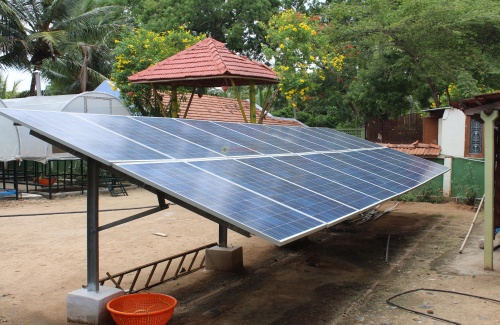Introduction
As the world faces the urgent need to address environmental challenges, the adoption of clean and sustainable energy sources is crucial. Solar panels, which harness the power of the sun to generate electricity, have gained popularity for their environmental benefits. In this article, we will explore the significant environmental advantages of using solar panels for electricity.
Reduction in Greenhouse Gas Emissions
One of the most compelling environmental benefits of solar panels is their ability to reduce greenhouse gas emissions. Traditional electricity generation methods, such as burning fossil fuels (coal, natural gas, and oil), release carbon dioxide (CO2) and other pollutants into the atmosphere. These emissions contribute to the greenhouse effect, trapping heat in the Earth's atmosphere and leading to global warming.
In contrast, solar panels generate electricity without producing any greenhouse gas emissions during operation. Solar photovoltaic (PV) systems convert sunlight into electricity by exciting electrons in semiconductor materials, creating an electric current. This clean, renewable process significantly lowers the carbon footprint of electricity generation.
By switching to solar power, you directly contribute to the reduction of CO2 emissions and other harmful pollutants. The more households and businesses adopt solar panels, the less reliance there is on fossil fuels for electricity, which is a critical step toward mitigating climate change and protecting the planet.
Air Quality Improvement
In addition to reducing CO2 emissions, solar panels contribute to improved air quality. Traditional power plants that burn fossil fuels release not only CO2 but also various pollutants and particulate matter into the air. These pollutants can have detrimental effects on air quality and public health.
Solar panels are a pollution-free energy source. Their operation produces no harmful emissions, making them an excellent choice for urban areas where air quality is often a significant concern. By adopting solar power, you help reduce the emission of pollutants such as sulfur dioxide (SO2), nitrogen oxides (NOx), and particulate matter, which can lead to respiratory and cardiovascular health issues.
The positive impact on air quality is particularly pronounced in regions with high solar energy adoption. Fewer emissions from power plants result in cleaner, fresher air, making it safer and healthier for local communities.
Conservation of Water Resources
Traditional power plants, especially those powered by coal, natural gas, and nuclear energy, consume vast amounts of water for cooling purposes. Water scarcity is a growing concern, with many regions facing the challenge of managing limited water resources. Solar panels offer a sustainable solution to address this issue.
Solar panels require minimal water for maintenance and cooling. The water used in cleaning and maintaining solar panel installations is a fraction of what traditional power plants consume. In arid or water-stressed regions, this conservation of water resources is essential for preserving local ecosystems and ensuring access to clean water for communities.
By reducing water usage in electricity generation, solar panels help alleviate the pressure on water supplies, contributing to the conservation of this precious resource. This is especially vital in areas prone to droughts and water shortages.
Reduced Land Disturbance and Habitat Preservation
The installation of traditional power plants, including fossil fuel and nuclear power facilities, often involves significant land disturbance. Mining for coal, the construction of power plant infrastructure, and the creation of large reservoirs for hydropower plants can lead to deforestation, habitat destruction, and alterations to natural landscapes.
In contrast, solar panels can be installed on existing structures, such as rooftops, without the need for additional land use or environmental disruption. This approach minimizes the ecological impact of energy generation and helps preserve natural habitats.
Moreover, solar panel installations on open land can be designed to coexist with the environment. Ground-mounted solar arrays can be constructed with minimal impact on local ecosystems, allowing vegetation to thrive underneath and around the panels. Some solar installations even incorporate native plant species to promote biodiversity and restore habitats.
By choosing solar panels, you support a more environmentally responsible approach to energy generation that respects the Earth's ecosystems and reduces land disturbance and habitat destruction.
Reduced Light and Noise Pollution
Traditional power plants and urban infrastructure can contribute to light and noise pollution. Light pollution, in particular, can disrupt natural ecosystems, affect wildlife behavior, and hinder stargazing. High-intensity lighting used at night, such as in urban areas, can disrupt natural circadian rhythms of both humans and wildlife.
Solar panels, especially those installed on rooftops, produce minimal light and noise pollution. The low-profile design of solar arrays helps mitigate light pollution, allowing for more natural nightscapes in urban and suburban areas. Moreover, solar installations do not emit noise during operation, unlike power plants that rely on combustion processes.
By choosing solar panels for electricity generation, you contribute to the reduction of light and noise pollution, creating a more peaceful and harmonious environment for both humans and wildlife.
Conclusion
The environmental benefits of using solar panels for electricity are substantial and play a crucial role in addressing pressing global challenges. Solar panels help reduce greenhouse gas emissions, improve air quality, conserve water resources, preserve natural habitats, and reduce light and noise pollution.
As the world transitions to cleaner and more sustainable energy sources, solar power stands out as a viable and environmentally responsible option. By adopting solar panels, you can contribute to a healthier and more sustainable planet while enjoying the economic advantages of reduced energy costs and increased property value. The environmental benefits of solar panels extend to the global and local levels, making them an integral part of the transition to a more sustainable and eco-friendly energy future.


No comments yet